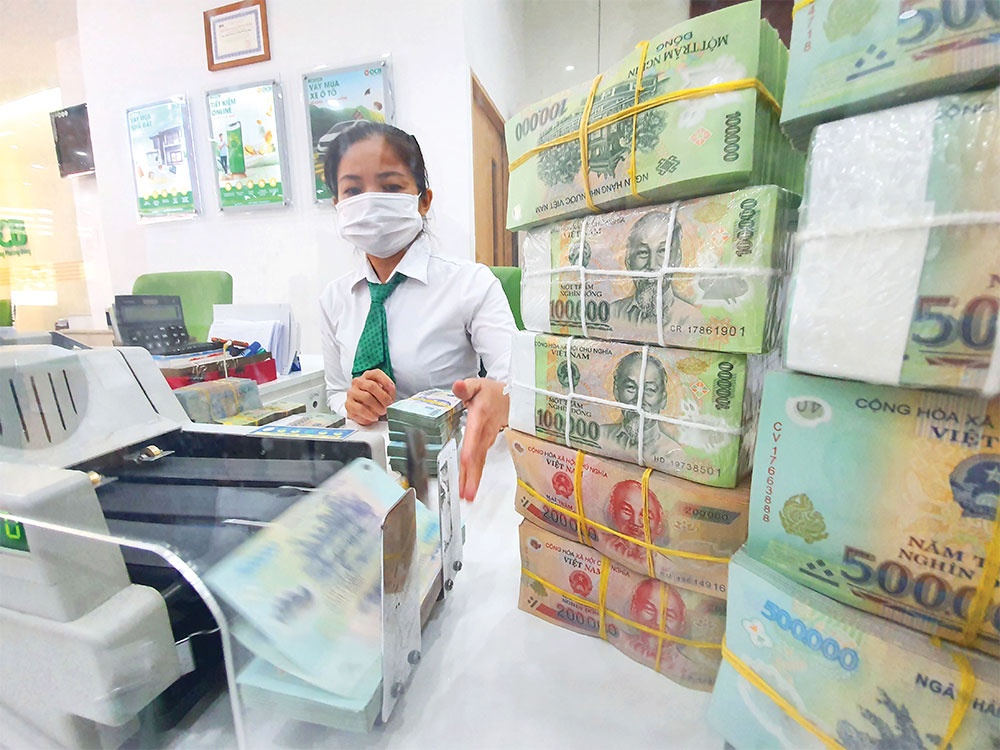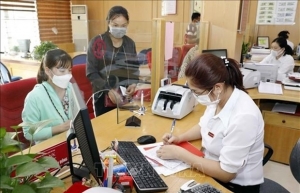INTERNATIONAL INVESTMENT
AND PORTAL
Regarding the need to borrow money from banks now that the credit room has been loosened, Phan Thanh Tinh, director of Viet Au Seafood in the southern province of Dong Nai, said that currently there is no need for a loan. While businesses take credit from banks for production and business purposes, the market demand has fallen sharply and imported materials become expensive, creating a decrease in output for enterprises.
 Banks are making adjustments to support corporate customers and individuals, photo Le Toan
Banks are making adjustments to support corporate customers and individuals, photo Le Toan
“We do not dare to plan for new projects or expansion activities,” Tinh said. “If the output is good, a loan with an interest rate of 13-14 per cent is not a problem for businesses. But, at the moment, I am trying to ensure employees don’t need a break or a 2-month early Lunar New Year as many other businesses have to do. In this dark situation, we cannot borrow money from banks but have to find a way to defend ourselves.”
Tinh said that usually the month before the festive season is the peak period for sales, but now there is almost no sales. “Last November, despite the pandemic, the month’s revenues hit more than VND7 billion ($304,000) with 4-5 delivery trucks per day, and this year it’s only VND2 billion ($85,000) with only 2-3 trucks a week,” he said.
Likewise, the owner of a packaging business in the same province shared that consumers are cutting unnecessary expenses. “Obviously, demand is falling sharply, so investing and expanding at this time are not a good idea. I am currently using my spare money to get through this difficult time,” he said. “Never in my business life has November been as quiet as last month.”
On December 5, the State Bank of Vietnam (SBV) increased the credit room from 1.5 to 2 per cent, equivalent to VND240 trillion ($10.2 billion) supplied to the economy. Several days later, SHB launched a programme to reduce interest rates up to 2 per cent per year for individual and corporate customers in priority areas and businesses of essential goods.
Prior to that on December 2, Agribank said that for outstanding loans arising this month, the bank will reduce up to 20 per cent compared to the current interest rate level in order to support corporate customers, cooperatives, and business households. Likewise, HDBank announced it would reduce lending interest rates to the end of the year to 3.5 per cent per year for individual and corporate customers in different industry groups. In the same period, Vietcombank will reduce interest rates by up to 1 per cent per year for VND loans from existing corporate and individual customers.
According to Dao Minh Tu, Standing Deputy Governor of the SBV, the credit allocation has many expectations. “Besides creating conditions for commercial banks to expand credit into necessary areas, credit allocation also encourages commercial banks with abundant liquidity to implement the policy of reducing interest rates,” Tu said.
Regarding the control of room loosening so that capital moves in the right direction, Tu added it is necessary to manage cash flow and monitor the activities of commercial banks. Based on the direction from the government, the SBV wants to focus on the field of agriculture in rural areas, small- and medium-sized enterprises, and exporting and supporting industries, especially in fields that are the driving force for the economy at the current time. The prime minister has also directed interest in the real estate sector, especially in helping people buy social housing and other living needs. So far, the SBV has directed commercial banks to create favourable conditions for these purposes.
“The SBV sets aside credit room and gives adequate priority to commercial banks with high liquidity, especially banks that are reducing interest rates,” explained Tu. “This is one of the policies to encourage commercial banks to reduce lending rates. Of course, along with that is the active efforts of commercial banks, by all means, to reduce their operating costs to create conditions for reducing interest rates for businesses, projects, and fields that are in need.”
Nguyen Quoc Hung, general secretary of the Vietnamese Banking Association, said that while real estate businesses are complaining, considering the conditions set by the bank is still a required step. “Loosening the credit room doesn’t mean loosening credit conditions. All must ensure the right principles,” he emphasised.
 Central bank to raise credit limit, banks slash interest rates
Central bank to raise credit limit, banks slash interest rates
The State Bank of Vietnam has raised the domestic banking system’s credit growth by 1.5-2.0 percentage points from the previous 14 per cent limit on December 5.
 The short-term implications of SBV credit room lift
The short-term implications of SBV credit room lift
Lifting the credit room may be a temporary solution. Tran Thi Khanh Hien, director of VNDirect’s Analysis Division, talked to VIR’s Hong Dung about the central bank’s move on credit.



















